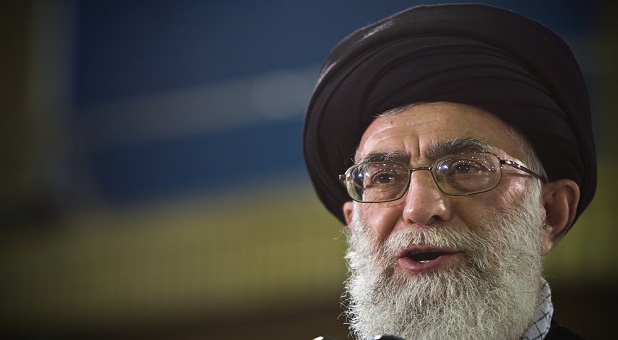WATCH: Which Republican Would Give Iran 18 Months to Violate the Deal Before We React?
Most of the leading Republican presidential candidates have said they would tear up President Obama’s nuclear deal with Iran on their first day in office. The treaty-posing-as-an-agreement, they warn, would pave the way for Tehran to obtain nuclear weapons, while lifting international sanctions and allowing the flow of Western dollars to fund fundamentalist Islamic terrorists.
Most—but not all. Jeb Bush has said he would “certainly look” at the possibility.
And this weekend his closest rival, Ohio Gov. John Kasich, said he would not necessarily end the nuclear arrangement at all.
“We don’t what’s going to happen in 18 months,” he told Fox News Sunday this weekend.
“If they fund the radicals like Hamas and Hezbollah, then I think in that kind of a case we’ve got to slap the sanctions back on,” he said. “We would then have the high moral ground to talk to our allies and have them go along with us.”
But we need not wait 18 months to find the answer to that question: Iran is funding both organizations today. No one in the U.S. government or any other intelligence agency disputes that Iran has been a leading state sponsor of terrorism for a generation.
According to the U.S. State Department:
Iran has historically provided weapons, training, and funding to Hamas and other Palestinian terrorist groups, including Palestine Islamic Jihad (PIJ) and the Popular Front for the Liberation of Palestine-General Command (PFLP-GC) …
Although Hamas’s ties to Tehran have been strained due to the Syrian civil war, in a November 25 speech, Supreme Leader Khamenei highlighted Iran’s military support to “Palestinian brothers” in Gaza and called for the West Bank to be similarly armed. In December, Hamas Deputy Leader Moussa Abu Marzouk announced bilateral relations with Iran and Hamas were “back on track.”
In March, Israeli naval forces boarded the Klos C cargo ship in the Red Sea off the coast of Sudan. On board, they found 40 M-302 rockets, 180 mortars, and approximately 400,000 rounds of ammunition hidden within crates of cement labeled “Made in Iran” and believed to be destined to militants in the region.
Since the end of the 2006 Israeli-Hizballah conflict, Iran has also assisted in rearming Lebanese Hizballah, in direct violation of UNSCR [United N Security Council Resolution] 1701.
Nor does anyone pretend this nuclear deal will do anything but accelerate those trends. Senior Obama administration figures testified before the Senate Foreign Relations Committee in August that it is “nearly certain” that Iran will continue to fund terrorist groups.
In other words, Kasich has said we must give Iran $150 billion in frozen assets and wait 18 months to see if it continues doing what it is doing right now.
The good news is, the program will not be the same as it is now. The bad news is, it will be much deadlier.
With a larger cash flow, the Ayatollah Ali Khamenei has since announced bigger goals for his terrorist regime. He said last week that Israel will not exist in 25 years. (That’s 23-and-a-half years, not counting the 18 months Kasich wants to give them in good faith.)
But America won’t have to worry that we will get conned in future deals; there won’t be any. The Ayatollah said, “We agreed to hold talks with America only on the nuclear issue and for particular reasons—and thank Allah—our negotiators did a good job.”
It’s hard to see how this policy is in U.S. interests.
It’s also difficult to see how such a proposal aligns with either grassroots or the megadonors of the Republican Party, both of whom are fairly hawkish. If anything, the grassroots are less likely to want to enter foreign wars than the donor class Kasich is courting.
But Kasich has surged in the polls, so presumably he has a strategy.
On that point, he outdoes his nearest rival for the Establishment primary: Jeb Bush. Contrast Kasich’s crisp, authoritative answers with Jeb Bush’s halting, passive delivery while speaking of the same policy.














































